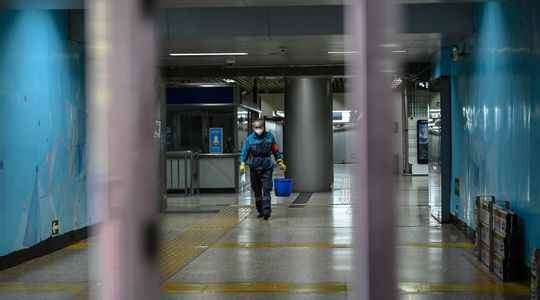The “zero Covid” policy is not about to stop in China. This weekend, the health authorities showered the hopes of an easing of the restrictions in force in the country, stressing that it will continue to be applied “unwaveringly”. This strategy consists of confining neighborhoods or entire cities as soon as cases appear, carrying out massive screenings or even quarantining people who test positive and travelers arriving from abroad.
No question of easing the measures when China reported its highest number of new cases of Covid-19 in six months on Monday, November 7. The Ministry of Health announced nearly 5,500 new local positive cases, many of them in the coastal province of Guangdong (south), a major manufacturing center. In Beijing, nearly 60 new cases were reported on Monday, leading to the closure of schools in the densely populated district of Chaoyang, the seat of the business district and many embassies.
Municipal authorities said Monday during a press briefing that the recent “successive epidemic outbreaks” had been “effectively controlled overall”. But many residents complain about these unexpected measures, which sometimes cause food shortages and complicate access to care for people in need. They have also resulted in several tragedies.
A series of health emergencies hampered by the “zero Covid”
The suicide by defenestration of a 55-year-old woman in the confined city of Hohhot, in Inner Mongolia (north), caused an outcry this weekend because, by the admission of the authorities themselves, the Covid restrictions hampered the rescue intervention. As is sometimes the case in China in certain districts, the access doors to the residential building had been sealed to prevent any exit.
The two daughters of the unfortunate, one of whom lived in the same apartment, had warned the authorities that their mother had suicidal thoughts, asking in vain for her evacuation. “Who has the right to weld the doors of the buildings?” Asked, furious, a surfer on the Weibo social network. “In the event of an earthquake or a fire, who will be responsible?” Local authorities have publicly criticized poor management by neighborhood officials.
On November 1, a three-year-old child deprived of care due to draconian health measures against Covid-19 died of carbon monoxide poisoning in Lanzhou, the confined capital of Gansu province (northwest). Viral images on social media had shown Lanzhou residents desperately trying to resuscitate the child. In a message published on the Internet, his father had complained about the slowness of the rescue and not having been able to leave his residence because of the confinement of the city, before his message was deleted. Residents expressed their anger.
The local police published a detailed account of the events on Thursday 3 last and offered their “sincere condolences” to the parents. “We sincerely accept the criticism as well as the control of the media and Internet users (…) to prevent such accidents from happening again”, wrote the police of Lanzhou, in an unusual repentance. The case had caused a stir with a storm of online messages, against the inflexible policy of the “zero Covid”. “Three years of pandemic have been his entire life,” wrote a surfer, referring to the age of the child, named Tuo.
In October, the death of a 14-year-old girl, deprived of care while she was in quarantine in Ruzhou (center), had already caused outrage in the country. Videos on Douyin (Chinese version of TikTok) showed a woman lying on a bunk bed suffering from epilepsy, while people beside her cried out for help. The case sparked renewed anger online, but internet censors quickly deleted all reference to the incident. In January 2022, this time, a pregnant woman had a miscarriage at the door of a hospital in Xi’an (north), for lack of a valid PCR test.
